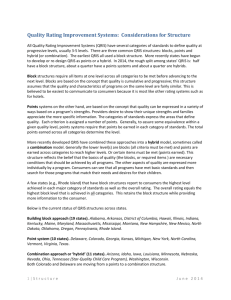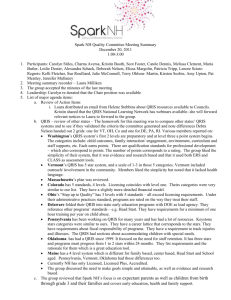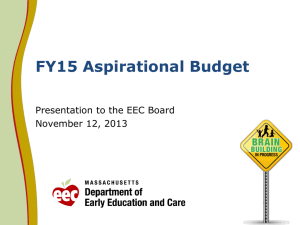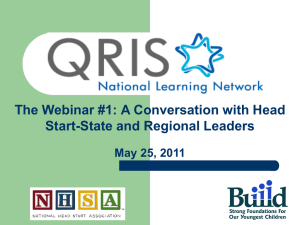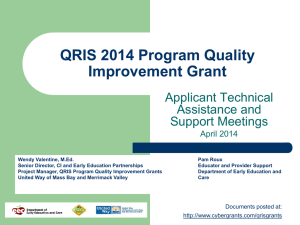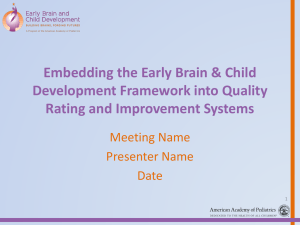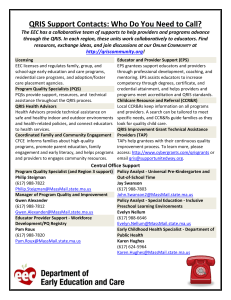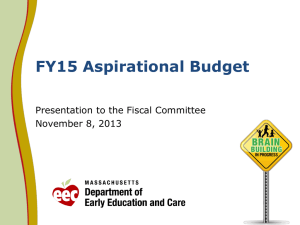EEC Performance Measurement Data Dashboard
advertisement
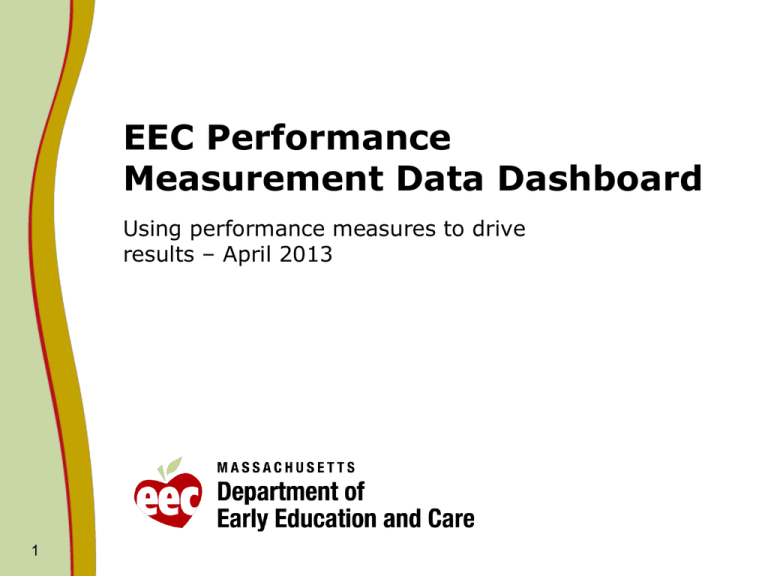
EEC Performance Measurement Data Dashboard Using performance measures to drive results – April 2013 1 EEC Performance Measurement EOE/EEC Strategic Plan MassResults: Building a ResultsOriented Government Program, Child, Educator Data EEC Performance Measurement Dashboard 2 Developing and Using the EEC Dashboard Agency/EEC Board Devises Performance Metrics EEC targets actions that improve performance Use Dashboard to Enhance Performance Allows leadership to make informed decisions 3 Dashboard makes Data Visible Shows results and progress against metrics So, What Do We Track? Just about everything! Licensing data Program data Fiscal data Professional Qualifications data Child demographics data RTTT reports Legislative reports 4 The key is highlighting relevant data in a simple and easy to understand way Create a Compelling Dashboard Visual representation effectively communicates: 5 1. where are we now? 2. where do we want to be? 3. when do we need to be there? Performance Measurement Categories 6 Access Number of children on the Waitlist for subsidized care Average length of time on Waitlist prior to enrollment New children on Waitlist versus enrolled per month Available child care slots compared to number of children needing care Quality – Quality Rating and Improvement System (QRIS) Percentage of programs in QRIS Percentage of programs in QRIS level 2 and higher Percentage of programs receiving subsidy in QRIS Percentage of subsidized children served in high quality programs Performance Dashboard GOALS Status Trend Measured Period Current Prior Target # of WL children Increasing Monthly 53975 52813 45000 Average duration on WL Increasing Monthly 9.44 8.99 6 months New Children on WL vs. Enrolled Increasing Monthly 1469/122 = 12 1208/45 5= 2.7 1 to 1 ratio Monthly ___ ___ ___ ACCESS Available Slots vs. WL ____ QUALITY % of Programs in QRIS Stable Quarterly 47% 46% 40% % of Programs QRIS L2 Improving Quarterly 13% 11% 15% % Programs that receive subsidy Stable Quarterly 92% 92% 90% % subsidized children served L2 Improving Quarterly 50% 42% 50% Performance Key 7 Meeting or exceeding expectations Needs improvement Not meeting expectations Under development Access - Number of children on the Waitlist for subsidized care Waitlist by Age Group July 2012 to March 2013 Number of Children 60000 53975 50000 40000 30000 41778 44131 46311 47659 49111 50261 51792 52813 20000 Infants 10000 Toddlers 0 Jul-12 Aug-12 Sep-12 Oct-12 Nov-12 Dec-12 Jan-13 Feb-13 Mar-13 Preschool School Age Jul-12 Aug-12 Sep-12 Oct-12 Nov-12 Dec-12 Jan-13 Feb-13 Mar-13 Infants 4138 4388 4670 4793 4861 4817 4938 4907 4892 Toddlers 8285 8691 8943 9166 9489 9668 9861 10011 10110 Preschool 13003 13575 14056 14217 14488 14742 14967 15298 15541 School Age 16352 17477 18642 19483 20273 21034 22026 22597 23432 Total 41778 44131 46311 47659 49111 50261 51792 52813 53975 What is the average increase monthly? 1525 8 Total Access - Average length of time to wait prior to enrollment Duration in months Average Duration on Waitlist in Months July 2012 to March 2013 14.00 12.00 10.00 8.00 6.00 4.00 2.00 0.00 Jul-12 Aug-12 Infant Infant Toddler Preschool School Age Total 9 Jul-12 5.77 9.17 8.07 4.93 6.98 Sep-12 Oct-12 Toddler Aug-12 6.00 8.33 7.37 5.77 6.87 Sep-12 4.50 8.30 7.90 6.27 6.74 Nov-12 Dec-12 Preschool Oct-12 4.37 8.97 8.63 5.17 6.78 Nov-12 4.43 8.90 8.83 6.53 7.18 Jan-13 Feb-13 School Age Dec-12 4.83 9.90 8.73 8.13 7.90 Mar-13 Total Average Jan-13 4.60 10.13 9.47 8.63 8.21 Feb-13 5.07 11.23 11.10 8.57 8.99 Once access is re-opened waitlist duration is expected to decrease Mar-13 5.23 12.13 11.17 9.23 9.44 Access – New Children on Waitlist vs. Children Enrolled Per Month New Children on the Wailist vs. Children Enrolled Per Month - July 2012 to March 2013 2372 2500 2119 2000 1997 1746 1627 1392 1500 1079 1000 1325 1208 1060 906 749 558 500 1469 525 350 455 122 0 Jul-12 Aug-12 Sep-12 Oct-12 Nov-12 New Children on Waitlist 10 Dec-12 Jan-13 Children enrolled Feb-13 Mar-13 Access - Available child care slots compared to number of children needing care 11 Available child care slots compared to number of children needing care Under development When filling Contract Slots age group and location are taken into consideration Quality - Percentage of programs in QRIS % Participating in QRIS July 2012 to March 2013 70% % of programs 60% 50% 40% 39% 30% 29% 26% 20% 54% 54% 42% 44% 40% 37% 55% 55% 55% 56% 56% 45% 45% 45% 46% 46% 41% 41% 42% 42% 43% 57% 47% 43% 10% 0% 7/1/2012 8/1/2012 9/1/2012 10/1/2012 11/1/2012 12/1/2012 1/1/2013 2/1/2013 3/1/2013 Family Child Care 12 Large Group and School Age Total Quality - Percentage of programs in QRIS level 2 and higher % Programs in QRIS Level 2 and Higher 25% 20% 15% 20% 20% 20% 21% 21% 17% 11% 12% 12% 8% 9% 13% 14% 17% 13% 11% 11% 10% 5% 21% 9% 10% 11% 10% 9% 8% 20% 13% 11% 0% 7/1/2012 8/1/2012 9/1/2012 10/1/2012 11/1/2012 12/1/2012 1/1/2013 2/1/2013 3/1/2013 Family Child Care 13 Large Group and School Age Total Quality - Percentage of programs in QRIS that receive subsidies % Programs in QRIS the Receive Subsidies July 2012 to March 2013 100% 96% 96% 96% 96% 93% 93% 93% 93% 93% 88% 87% 88% 88% 87% 87% 87% 87% Jul-12 Aug-12 Sep-12 Oct-12 Nov-12 Dec-12 Jan-13 Feb-13 96% 96% 95% 95% 95% 90% 85% 93% 89% 92% 95% 92% 86% 80% 75% Family Child Care 14 Large Group and School Age Total Mar-13 Quality - Percentage of subsidized children served in high quality programs % Children in QRIS Level 2 and Higher Programs 70% 60% 56% 55% 54% 50% 40% 46% 46% 47% 60% 52% 23% 24% 26% 53% 58% 48% 50% 28% 34% 31% 26% 56% 50% 51% 44% 42% 30% 20% 60% 28% 33% 10% 0% 7/1/2012 8/1/2012 9/1/2012 10/1/2012 11/1/2012 12/1/2012 1/1/2013 2/1/2013 3/1/2013 Family Child Care 15 Large Group and School Age Total Conclusions 16 What other metrics are relevant to EEC for inclusion in a dashboard view? Licensing metrics • Licensing visits ratios Educator metrics • Educator credential metrics Using Performance Measurement as a part of EEC’s Risk Management initiative Follow up at Policy Committee Meeting
